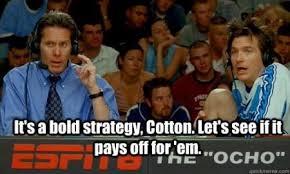Why not “youth activists win climate change fight against montana?”
Asshole replies aside: I took a technical writing course in which we learned that people struggle talking to Americans because we are obsessed with using negatives as a form of emphasis. How are you doing? Not bad! Thank you! No problem. Do you mind doing me a favor? Not at all!
This is especially difficult who already struggle with affirmatives and then need to translate the negative. Combine this with Americans’ constant need to appeal to power, you get headlines like “Goliath Loses Battle to David With a Stone,” or “No one saw This Heat Coming,” or “What You’re Probably Doing Wrong With Your Used Toilet Paper.”
Except for " Do you mind…" I see you point and never noticed it before. I’m guilty of most of these.
However, the polite response to “Do you mind?” is “no.” Otherwise you would mind, and if you do mind, you wouldn’t want to do the favor. It’s actually a weird question because it basically flips the meaning of “yes” and “no” you usually expect.
That’s a good argument untiiiillll you consider that this question is essentially a negated version of “Will you please…”
See also: “Why don’t you…”
Not really, you’re asking if it would be an inconvenience with would you mind.
Your examples are direct requests.
Yeah the asshole replies were unexpected, had no idea it would offend so many people
Fascinating. NGL it’s really gratifying to learn how openly the rest of the world notices America’s cultural detachment. They think they can hold onto a global monopoly of culture, while having the social skills of the average 9 year old. Things are clashing and friction is mounting, as it should.
Huh, I know people make a lot of assumptions online, but I hadn’t felt that myself until now realizing you assume I learned this recently. I took this class nearly 15 years ago. You put some respect in your tone when you address your elders, you little bastard!
I’m calling it now: we early-phase millennials are gonna be real cussy old folks. Telling harrowing tales of tubgirl, jumpscare videos, and 90% of our celebrities being pedos or cultists.
Because immediately stating the state lost in a headline has more impact. Do you not grasp writing.
Either way it exclaims the same thing so your gripe is moot.
I do grasp writing, that is specifically why I asked this question, because the headline framing it as a loss is negative to people who aren’t already supportive of climate action.
I do grasp writing, that is specifically why I asked this question, because the headline framing it as a loss is negative to people who aren’t already supportive of climate action.
That’s a lot of sentence. I would’ve used em dashes or maybe a semicolon to break up those thoughts.
This is a comment section, not a peer-reviewed journal, sir

And yet the information is just as fabricated…
“Do you not grasp writing,” they say, forgetting to put a question mark at the end of their question.
This is the best summary I could come up with:
Experts previously predicted that a win for youths in Montana would set an important legal precedent for how courts can hold states accountable for climate inaction.
The same legal organization representing Montana’s young plaintiffs, Our Children’s Trust, is currently pursuing similar cases in four other states, The Washington Post reported.
Montana tried to argue that adjusting its energy policy and other statutes would have “no meaningful impact or appreciable effect,” the Post reported, because climate change is a global issue.
Montana Assistant Attorney General Michael Russell described the testimony as a “week-long airing of political grievances that properly belong in the Legislature, not a court of law,” according to the Post.
Another attorney for plaintiffs and executive director of Our Children’s Trust, Julia Olson, told AP that the ruling was a “huge win for Montana, for youth, for democracy, and for our climate.”
To young people suing, winning is seemingly just about pushing the state to embrace climate science and mitigate known harms moving forward.
I’m a bot and I’m open source!
This summary doesn’t tell us what they ruled on at all.
Just wanted to point out that ars technica is owned by the same majority investor of reddit.
Didn’t they sell their stake a while ago?





